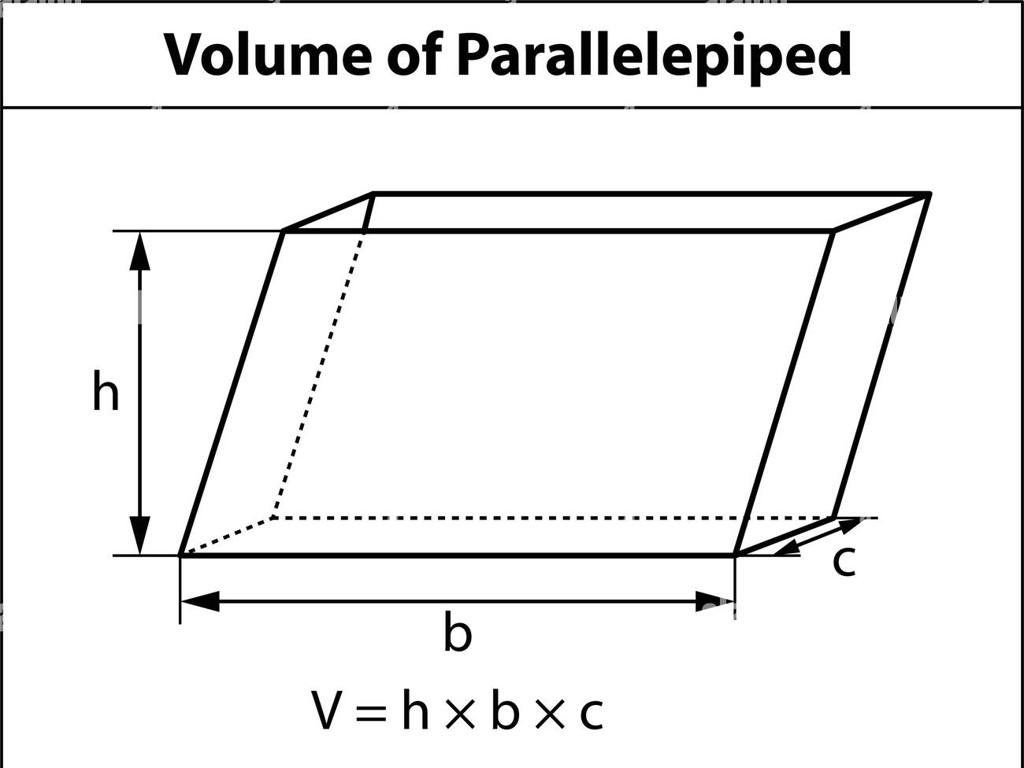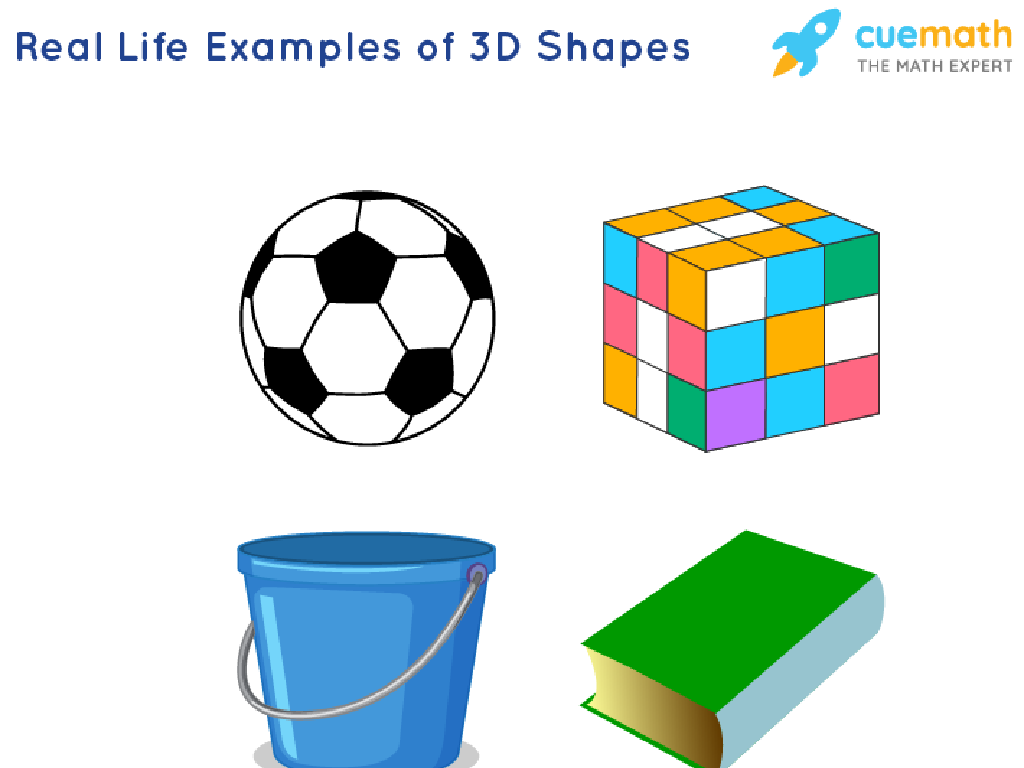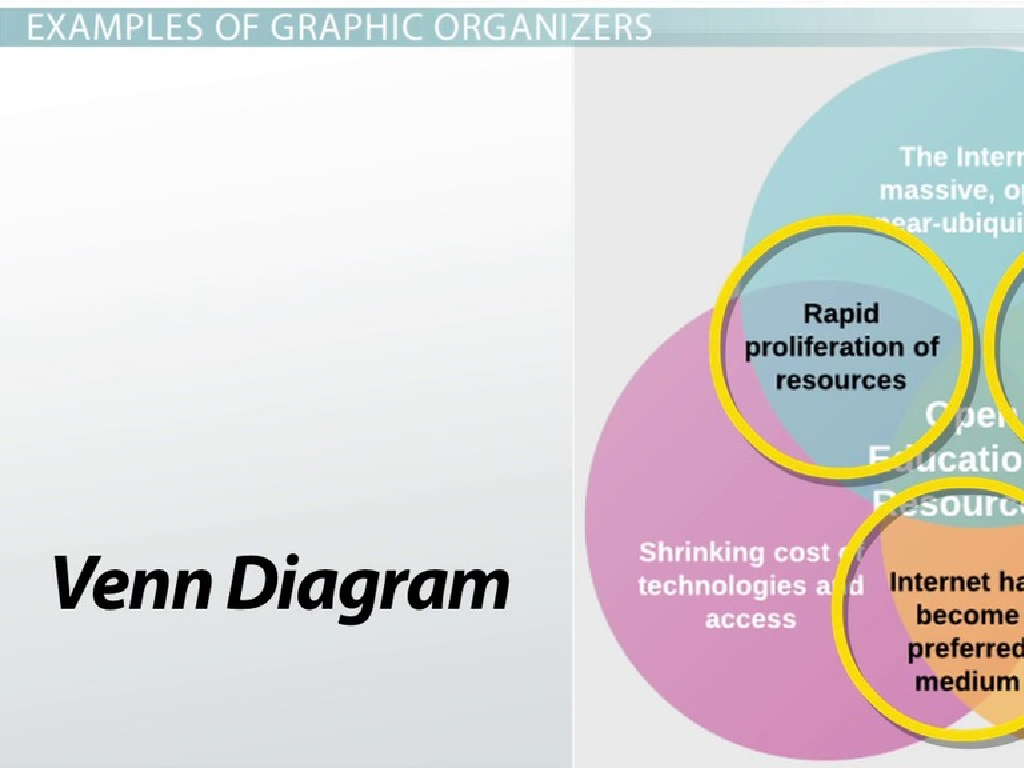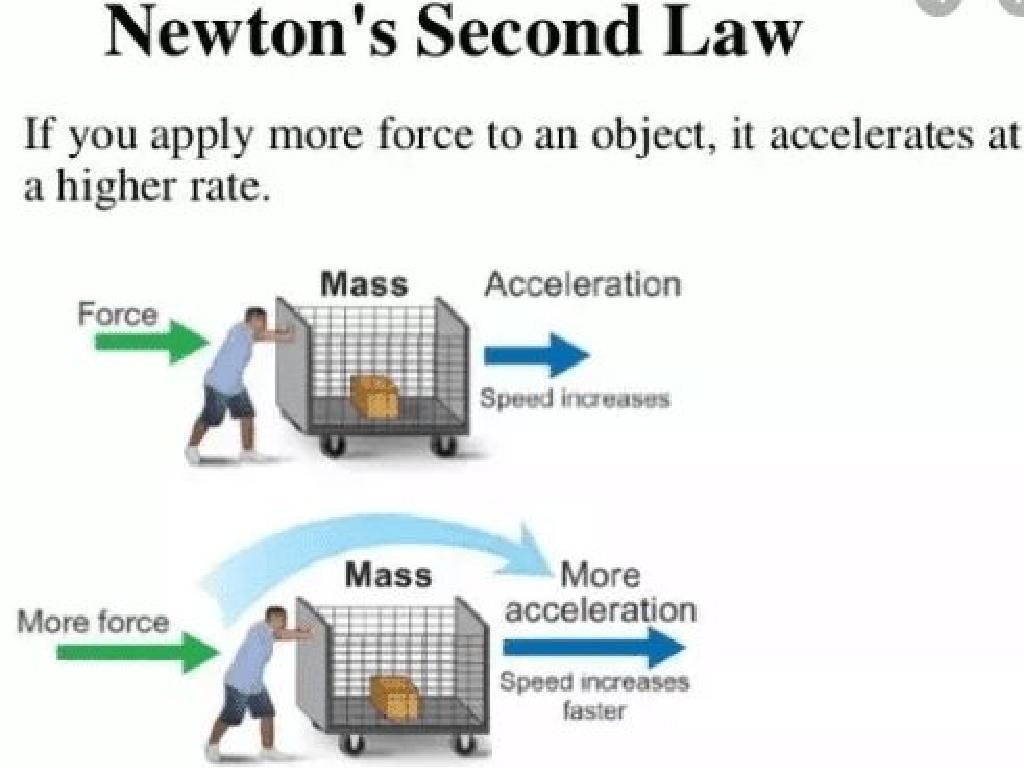Determine The Meaning Of A Word With Pre-, Re-, Or Mis-
Subject: Language arts
Grade: Fourth grade
Topic: Prefixes And Suffixes
Please LOG IN to download the presentation. Access is available to registered users only.
View More Content
Welcome to Prefix Power!
– Discovering Prefixes
– Prefixes are word parts added to the beginning of a word to change its meaning.
– Prefixes: pre-, re-, mis-
– ‘pre-‘ means before, ‘re-‘ means again, ‘mis-‘ means wrong or badly.
– Prefixes alter meanings
– Like magic, prefixes transform words into new ones with different meanings.
– Examples: redo, misplace, preview
– ‘redo’ means to do again, ‘misplace’ means to place wrongly, ‘preview’ means to view before.
|
This slide introduces the concept of prefixes to the students, focusing on ‘pre-‘, ‘re-‘, and ‘mis-‘. Start by explaining what prefixes are and how they are used to alter the meanings of words. Provide examples for each prefix, showing how they change the word’s definition. For instance, ‘pre-‘ is added to ‘view’ to make ‘preview’, which changes the meaning to looking at something before it happens. Encourage students to think of other words they know that use these prefixes and discuss how the meaning changes. This will help them understand the power of prefixes in building vocabulary.
Exploring Prefixes: pre-, re-, mis-
– What is a Prefix?
– A prefix is a word part added to the beginning of a base word to change the meaning.
– Prefixes change word meanings
– ‘pre-‘ means before, ‘re-‘ means again, ‘mis-‘ means wrong or badly.
– Examples: pre-, re-, mis-
– ‘preview’ (view before), ‘redo’ (do again), ‘misplace’ (place wrongly).
– Practice with prefixes
|
This slide introduces the concept of prefixes to fourth-grade students, focusing on ‘pre-‘, ‘re-‘, and ‘mis-‘. Begin by defining a prefix and explaining how it alters the meaning of a base word. Provide clear examples for each prefix, such as ‘preview’ meaning to view something beforehand, ‘redo’ meaning to do something again, and ‘misplace’ meaning to place something in the wrong way. Encourage students to think of other words they know that include these prefixes. Conclude with an interactive activity where students create new words using these prefixes to reinforce their understanding.
The Power of ‘pre-‘: Understanding Prefixes
– ‘pre-‘ means ‘before’ or ‘in advance’
– Examples: preview, predict, prepare
– ‘preview’ means to view before, ‘predict’ is to say before, ‘prepare’ is to get ready in advance
– Breaking down ‘preview’
– ‘pre’ means before + ‘view’ means to see, so ‘preview’ means to see before
– How ‘pre-‘ changes a word
– Adding ‘pre-‘ to a word gives it a meaning related to time, often before something happens
|
This slide introduces the prefix ‘pre-‘ and its meaning. Emphasize that ‘pre-‘ is added to the beginning of a word to change its meaning, usually to indicate something that happens before another event. Use the examples provided to show how ‘pre-‘ alters the meaning of the base word. For instance, ‘view’ on its own means to see, but with ‘pre-‘ it becomes ‘preview’, which means to see something before it happens. Encourage students to think of other words with the prefix ‘pre-‘ and discuss how the meaning changes. This will help them understand how prefixes can be powerful tools in determining the meaning of new words.
Revisit with ‘re-‘: Understanding Prefixes
– ‘re-‘ means ‘again’ or ‘back’
– Examples: reread, rewrite, return
– ‘reread’ to read again, ‘rewrite’ to write again, ‘return’ to come back
– Breaking down ‘rewrite’
– ‘rewrite’ = ‘write’ again or edit
– Practice with ‘re-‘ words
|
This slide introduces the prefix ‘re-‘ and its meaning. Emphasize that ‘re-‘ is added to the beginning of a word to indicate repetition or returning to a previous state. Use common words like ‘reread’, ‘rewrite’, and ‘return’ as examples to illustrate the concept. For ‘rewrite’, break it down to show that it combines ‘re-‘ (again) with ‘write’, meaning to write something again. Encourage students to think of other words that start with ‘re-‘ and discuss what they might mean. As an activity, students can use ‘re-‘ to create new words from a list of base words and use them in sentences to demonstrate their understanding.
Understanding Prefixes: The Power of ‘mis-‘
– ‘mis-‘ means ‘wrongly’
– Examples: misplace, misprint, mistake
– misplace: to put in the wrong place, misprint: an error in printing, mistake: an error made by misunderstanding
– Dissecting ‘mistake’
– ‘mis-‘ + ‘take’ (to understand) = to understand wrongly
– How ‘mis-‘ changes meaning
– Adding ‘mis-‘ to a word can turn a regular action into an error
|
This slide introduces the prefix ‘mis-‘ and its meaning of ‘wrongly’ or ‘incorrectly.’ Start by explaining what prefixes are and how they modify the meanings of words. Provide examples like ‘misplace,’ ‘misprint,’ and ‘mistake’ to illustrate the concept. Break down the word ‘mistake’ to show how ‘mis-‘ is combined with ‘take’ to form a new word that means to understand something wrongly. Emphasize how adding ‘mis-‘ to the beginning of a word can change a simple action into an error or a wrong action. Encourage students to think of other words with the prefix ‘mis-‘ and discuss how the meaning is altered. This will help them understand how prefixes can be powerful tools in determining the meaning of new words.
Prefix Practice: Crafting New Words
– Activity: Build words with pre-, re-, mis-
– Combine each prefix with a base word
– Share your creative words with classmates
– Understand how prefixes change meanings
– ‘pre-‘ means before, ‘re-‘ means again, ‘mis-‘ means wrong or badly
|
This slide introduces an interactive class activity focused on understanding and using prefixes. The prefixes ‘pre-‘, ‘re-‘, and ‘mis-‘ are commonly used in the English language to alter the meaning of base words. Students will create new words by adding these prefixes to base words they are already familiar with. For example, ‘view’ can become ‘preview’, ‘do’ can become ‘redo’, and ‘take’ can become ‘mistake’. Encourage students to think creatively and come up with a list of words they can modify with these prefixes. After creating their list, students will have the opportunity to share their new words with the class, explaining how the prefix changes the word’s meaning. This activity will help students understand how prefixes can be used to expand their vocabulary and enhance their understanding of word meanings. Provide guidance and support as needed, and prepare to offer examples if students struggle to come up with their own.
Prefix Game Time: Match the Prefix!
– Play ‘Match the Prefix’ game
– Find word pairs with same prefix
– Discuss prefix meaning changes
– ‘Re’ in ‘redo’ means ‘to do again’, changing the meaning of ‘do’.
– Share examples with the class
– If ‘pre’ is in ‘preview’, it means ‘to view before’.
|
This interactive game encourages students to explore the impact of prefixes on word meanings. Students will search for words that share the same prefix, such as ‘pre-‘, ‘re-‘, or ‘mis-‘, and then discuss as a class how these prefixes alter the meanings of the base words. For example, ‘redo’ means to do something again, while ‘preview’ means to see something before it happens. The activity will help students understand that prefixes are word parts added to the beginning of a base word to create a new word with a modified meaning. Encourage students to come up with their own examples and explain the new meanings. This will help solidify their understanding of prefixes and how they can change word meanings.
Class Activity: Prefix Detectives
– Become a Prefix Detective!
– Search for pre-, re-, mis- words
– Look for words starting with ‘pre-‘, ‘re-‘, ‘mis-‘ in a book you enjoy
– Write down the words and meanings
– Use a dictionary or context clues to define them
– Share your findings with the class
|
In this engaging class activity, students will put on their detective hats to search for words with the prefixes ‘pre-‘, ‘re-‘, and ‘mis-‘ in books they love to read. They should write down each word they find along with its meaning, using context clues from the story or a dictionary for help. This will enhance their understanding of how prefixes alter the meaning of base words. Once they have their list, students will have the opportunity to share their discoveries with the class, fostering a collaborative learning environment. For the teacher: Prepare a list of example words with these prefixes, offer guidance on using context clues and dictionaries, and consider creating a display of all the words students find to reinforce the lesson.
Wrapping Up: Prefixes pre-, re-, mis-
– Review: Prefixes pre-, re-, mis-
– Prefix impact on word meanings
– ‘pre-‘ means before, ‘re-‘ means again, ‘mis-‘ means wrong or badly
– Homework: Craft sentences
– Use new words with these prefixes in your own sentences
– Share your sentences next class
– Be ready to present your sentences and explain the meanings
|
As we conclude today’s lesson, let’s recap the prefixes we’ve learned. ‘Pre-‘ indicates something occurring before, ‘re-‘ implies doing something again, and ‘mis-‘ suggests an incorrect action or interpretation. For homework, students should write their own sentences using words with these prefixes to reinforce their understanding. Encourage creativity and the use of a dictionary or thesaurus. In the next class, we’ll share these sentences to discuss and clarify any misconceptions about the meanings of these prefixes. This exercise will help solidify their grasp of how prefixes alter the meanings of base words.






